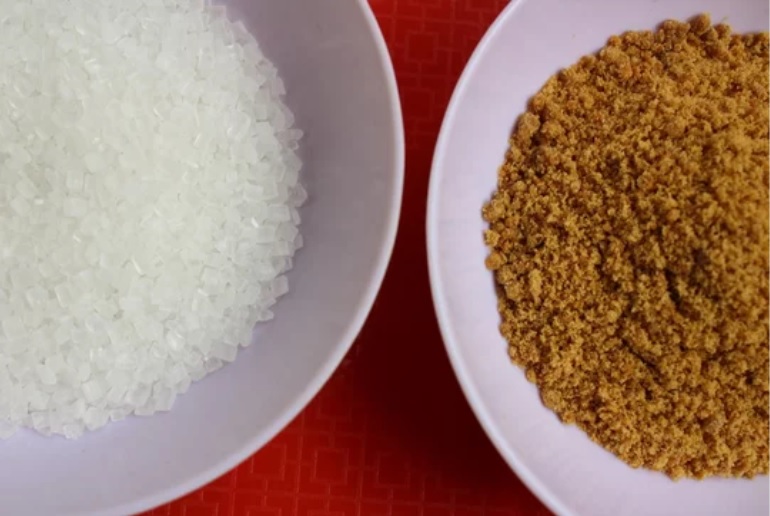INTRODUCTION
Between sugar and jaggery, none of the two takes the upper hand. Instead, one should decide whether to consume sugar or jaggery depending on their need, season, and the kind of food that is being made.
PREPARATION OF JAGGERY
- Jaggery is made from sugarcane.
- Sugarcane juice is extracted.
- Raw juice is heated.
- Lime is added to remove the topmost scum, which contains impurities.
- It is filtered to get a clear liquid.
- The liquid is concentrated by heating.
- A semi-solid brown mass is formed due to the presence of molasses. Molasses has high nutritional value as it contains proteins, minerals, vitamins, calcium, zinc, phosphorous, copper, etc.
- The brown mass is put into molds and allowed to solidify to get huge masses of jaggery, commonly called “gur” in India.
- The lighter the color, the better the quality of gur.
PREPARATION OF SUGAR
- Sugar is made from sugarcane.
- Sugarcane juice is extracted.
- Raw juice is heated.
- Lime is added to remove the topmost scum formed, which contains impurities.
- It is filtered to get a clear liquid.
- The liquid is concentrated by heating.
- Crystallization of liquid
- Centrifugation – In this step, molasses are removed, unlike jaggery, which marks the difference between the two.
Thus, the nutritional contribution of molasses in sugar is NIL.
- Sugar is formed.
This proves that sugar is a plain sac of calories, whereas jaggery contains the same sac of calories along with an additional sac of nutrients.
This means when we consume sugar or jaggery, it gives us the same kind of calories, but the only difference is that jaggery brings along some amount of nutrients with it.
BENEFITS OF JAGGERY
1. Good for digestion
Jaggery contains sucrose as well as fiber from molasses. This fiber helps to hold water which will make digestion easier.
2. Prevents anemia
It adds a little amount of iron to the body, which leads to a small rise in the RBC count, whose major component is iron. Thus, it prevents anemia (loss of RBC) to a certain extent.
3. Liver detoxification
It also helps in filtering the components of the liver and removing toxins.
4. Good for immunity
The proteins, vitamins, minerals, calcium, phosphorous, and zinc present in the molasses, which are a component of jaggery, help in improving body immunity.
BENEFITS OF SUGAR
1. Increases sugar levels
In case of a sudden drop in blood sugar levels, consuming sugar will increase the sugar level rapidly and gives instant relief as it is in a more concentrated form of sucrose when compared to jaggery.
2. Taste
It adds a very good taste and flavor to various delicacies.
Apart from all of this, it is said that-
Universally, jaggery is mostly consumed during winter, whereas sugar is mostly consumed during summer.
Why is that so?
This is because the composition of jaggery makes it a more heat-producing ingredient. Thus, it keeps the body warm when consumed during winter.
Whereas sugar is preferred during summers because, as we all know, summers are a hard-core hot climate.
It will drain out all the water and energy from everybody under the sun. Thus, some amount of sugar helps in providing that instant hype in glucose which helps us stay active.
DISADVANTAGES OF JAGGERY
1. Weight gain
Eating an excess of jaggery beyond one’s diet requirement will add to the calorie count of our body and lead to weight gain.
2. Diabetes
Too much jaggery also increases sugar levels in the blood.
3. Indigestion and constipation.
4. Infections
Our stomach might become a home for many parasites and bacteria as a result of consuming adulterated or contaminated jaggery.
5. Allergies
People sensitive to jaggery might also face allergic reactions like cold, cough, rashes, etc.
DISADVANTAGES OF SUGAR
1. Weight gain.
2. Increased risk of heart diseases and cardiac arrest due to accumulation of fats (triglycerides) and blockage of arteries.
3. Acne and wrinkles.
4. Diabetes, specifically hyperglycemia.
The above-spoken sugar and jaggery refer to the plain sugar and jaggery available in the market. They do have their respective advantages and disadvantages, which, though, can be consumed in reasonable quantities without any harm.
But apart from that, studies possess a big NOOOO to processed sugar.
That is, readymade sugar from the market can still be consumed, but sugar that is used as an additive to eatables sold in the form of chocolates, cakes, sweets, juices, etc, should be completely avoided. This is because they are considered to be unhealthy as they contain sugar along with certain harmful preservatives that help them stay intact for a very long time.
Therefore, from all the above-mentioned information, we can conclude that both sugar and jaggery have their own pros and cons.
The only difference between the two is that jaggery adds a little amount of nutrition along with glucose, whereas sugar is just a supplement of glucose.
But beyond all, it is not recommended to depend on jaggery or any other sweetener for a source of nutrients.
One can choose whether to eat sugar or jaggery depending on,
- Their need
- Recipe of the food
- Season
- Diet requirements etc.
Thus, eat wisely.
THANK YOU
MEDICAL ADVICE DISCLAIMER:
This blog, including information, content, references, and opinions, is for informational purposes only.
The Author does not provide any medical advice on this platform.
Viewing, accessing, or reading this blog does not establish any doctor-patient relationship.
The information provided in this blog does not replace the services and opinions of a qualified medical professional who examines you and then prescribes medicines.
And if you have any questions of medical nature, please refer to your doctor or qualified medical personnel for evaluation and management at a clinic/hospital near you.
The content provided in this blog represents the Author’s own interpretation of research articles.
